
 |
|
 |

 |
|
 |
| 07-25-2013, 02:46 PM | #1 |
|
Private
 
14
Rep 81
Posts
Drives: 2011 E92 M3
Join Date: Jun 2013
Location: Long Beach, CA
|
Theoretical Power/Torque Question
I was having a discussion with a friend of mine. The answer to our question may be common sense, but we've gone in enough circles at this point on the topic to have thoroughly confused ourselves. So here's the question:
If a vehicle had a flat power/torque curve, would it accelerate at the same rate, in 2 different gears? For example, a car may be geared in such a way that traveling at 45mph would require the engine to be at 3,000rpm in 3rd gear or 2,000rpm in 4th gear. If the engine makes the same amount of power at both 2,000rpm and 3,000rpm, and they both mashed the accelerator, would they accelerate at the same rate?  Our conclusion: Yes, they would accelerate at the same rate. What do you think? |
| 07-25-2013, 03:35 PM | #4 |
|
Captain
    172
Rep 676
Posts |
If that seems impossible maybe it's because such an engine is impossible. One way of looking at why is that it requires a linear fall off in torque/rpm and the eventual falloff in torque/rpm is secondary to nonlinear factors such as friction and heat production.
|
|
Appreciate
0
|
| 07-25-2013, 05:15 PM | #5 | |
|
Private
 
14
Rep 81
Posts
Drives: 2011 E92 M3
Join Date: Jun 2013
Location: Long Beach, CA
|
Quote:
Maybe a similar, yet more realistic way to approach the problem would be to have 2 separate vehicles with fixed gears of different ratios. But when I think of it this way I would conclude that the lower geared vehicle would indeed accelerate more quickly. Which makes me rethink my original conclusion... which is where we ended up to begin with - hence the post. |
|
|
Appreciate
0
|
| 07-26-2013, 12:12 AM | #6 | |
|
Captain
    
48
Rep 611
Posts |
Quote:
The car's acceleration is affected by gearing, and--assuming the car has the traction to use the force applied to the wheels--the car will be accelerating harder in the shorter gear (in this case, 2nd gear harder than 3rd gear). |
|
|
Appreciate
0
|
| 07-26-2013, 02:28 AM | #7 | |
|
that's what SHE said!
75
Rep 1,163
Posts |
Quote:
The shorter the gearing (numerically higher) the higher the torque multiplication. This is why torque numbers by themselves don't matter, and why we have horsepower. Simple way to think about it #1. Turn off traction control and from a standstill, floor it in 1st gear, what happens? Smoke, lots and lots of smoke. To exaggerate the scenario, do the same thing and this time start in 3rd. No burnout. Why? The engine torque is the same, yet due to gearing, less torque hits the pavement. Another way to think about it is a pedal bike. Imagine the super easy to pedal gear vs the super difficult to pedal gear. If you pedal with the same force (torque) you absolutely do not accelerate at the same rate. The super easy to pedal gear accelerates you much faster vs the super difficult to pedal gear. The other byproduct (and this is why nothing is free) is that the fun in the super easy to pedal gear ends when your legs just can't pedal any faster. The super difficult to pedal gear however, you reach that rpm much much later, and although you don't accelerate as fast, you are able to obtain a much higher top speed. Finally, the easy way to test this is to get 2 of the exact same cars and race them in different gears. Cliff notes, the car that starts in the lower gear will always accelerate faster assuming it doesn't need to almost immediately change gears.
__________________
 |
|
|
Appreciate
0
|
| 07-26-2013, 02:41 AM | #8 |
|
that's what SHE said!
75
Rep 1,163
Posts |
This is an even better illustration.
Quickly googled for this image so I don't take credit for it nor do I ensure accuracy, but it'll do. Let's concentrate on the blue lines. At 50kph, you can be in 1st, 2nd, 3rd, and 4th. Notice how the torque at the wheels is far greater in 1st, so on and so forth. 1st gear vs 3rd, you have more than twice the wheel torque at that speed in those different gears. Of course, at 70kph, the fun will come to an abrupt end for 1st gear assuming you don't shift while 3rd will continue to accelerate. 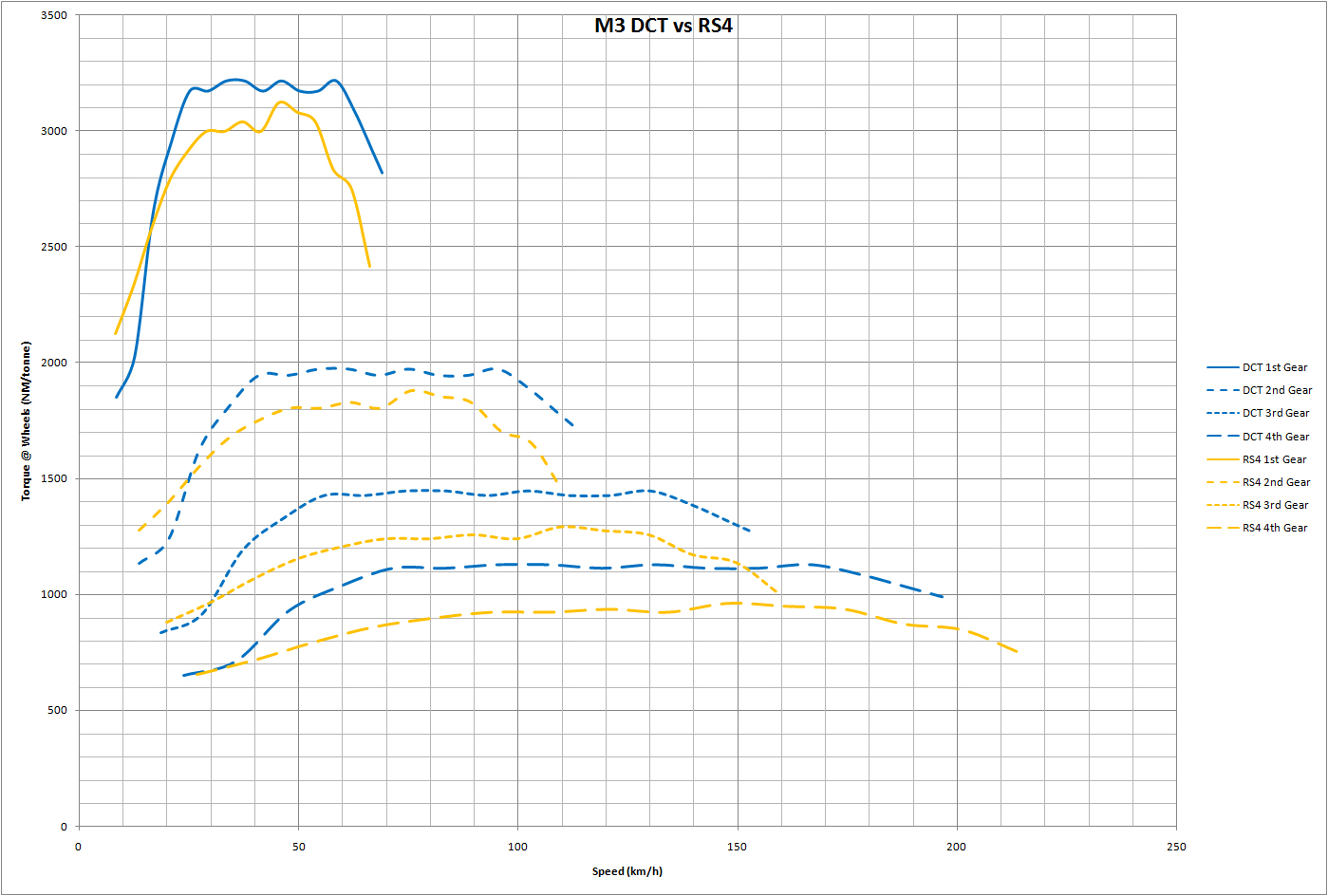
__________________
 |
|
Appreciate
0
|
| 07-26-2013, 06:02 AM | #9 |
|
No military grade

58
Rep 619
Posts |
Yes, they would.
You need a certain force to make a car accelerate, torque is a kind of "rotational force" to express this - BUT that torque is needed at the wheel, not at the engine, so gearing makes a difference. In your example, the gearing ratio between 3rd an 4th gear must be 1:1.5 and since the car makes the same power at 2000rpm in 3rd and 3000rpm in 4th, the engine torque ratio at those rpms has to be 1.5:1 in order to yield the same power as in your image. Thus, considering the gearing, the wheel torque is equal, hence, the same accelerating force is applied. "Power" factors all these effects in, since it is torque multiplied by rpms, so it gives a clear indication of what is left after gearing. Actually, on a limited scale, such engines do exist - for example, the N54 in the 335i has a falling torque curve between 5500 and 7000rpm, such that it makes practically the same power in that whole range. So, the acceleration in 3th and 4th gear at 95mph is the same. That also much is true for many diesel engines in the range between 4000 and 5000 rpm: Lower gear = high rpm but low engine torque, higher gear = higher engine torque but low rpm, both yielding about the same power.
__________________
 |
|
Appreciate
0
|
| 07-26-2013, 06:49 AM | #10 |
|
Major General
  
5010
Rep 6,866
Posts |
No. Due to gearing 3rd would obviously accelerate faster. They may be producing the same amount of power but 3rd gear would be able to spin faster thus accelerating quicker.
|
|
Appreciate
0
|
| 07-26-2013, 06:52 AM | #11 |
|
Captain
    
53
Rep 620
Posts |
|
|
Appreciate
0
|
| 07-26-2013, 07:01 AM | #12 |
|
No military grade

58
Rep 619
Posts |
You are both wrong:
What does "spin faster" mean? Both cars start at the same speed, so the wheels initially turn at the same rpm rate. So, "spin faster" in you notion must to refer to the rate at which the rpms change (aka acceleration). So basically, you both say: "3rd gear would accelarate faster because it can accelerate faster" The acceleration rate is dictated solely by the force at the wheels that can be applied. And the assumption was that this force is the same in both gears with some kind of fictional engine - so no dice.
__________________
 |
|
Appreciate
0
|
| 07-26-2013, 07:49 AM | #13 | |
|
Major General
  
5010
Rep 6,866
Posts |
Quote:
Lets say you were playing pool and you have two cue balls, one weighs 1lb and the other weighs 3lbs. You strike each one with exactly the same force. Which ball will accelerate faster? |
|
|
Appreciate
0
|
| 07-26-2013, 08:05 AM | #14 |
|
No military grade

58
Rep 619
Posts |
Again, wrong:
What you are referring to is the different gearing - car weight is the same. But gearing is already factored in with the term "power". If, for example, you have 200 Nm at 3000rpm in 3rd and 300 Nm at 2000rpm in 4th, you have the same power in both gears. The torque at the wheels is identical due to the 1:1.5 gearing ratio that you value so much. This wheel torque determines the forward force for acceleration and it is identical under these circumstances. The ONLY thing that is probably different is friction for different gears. Even then, that friction would be HIGHER for lower gears.
__________________
 Last edited by meyergru; 07-26-2013 at 10:59 AM.. |
|
Appreciate
0
|
| 07-26-2013, 11:45 AM | #16 | |
|
that's what SHE said!
75
Rep 1,163
Posts |
Quote:
__________________
 |
|
|
Appreciate
0
|
| 07-26-2013, 11:50 AM | #17 | |
|
Major General
  3434
Rep 6,771
Posts
Drives: 2016 BMW i8
Join Date: Dec 2006
Location: Monarch Beach
iTrader: (1)
Garage List 2012 BMW e92 M3 [0.00]
2021 BMW X5M [10.00] 2015 Porsche 991 Tu ... [10.00] 2015 Porsche 991 GT3 [10.00] |
Quote:
My car has a flat torque curve like that from 4,500 RPM all the way to 8,600 RPM so yes it's possible.
__________________
Current BMWs: 2022 X5 40i, 2016 X5 50i
2015 Porsche 991 Turbo S 1979 Porsche 911 Turbo (930) a couple others IG: longboarder949; YouTube: https://www.youtube.com/channel/UCT1...eoFBszPIK0gf9w |
|
|
Appreciate
0
|
| 07-26-2013, 12:15 PM | #18 | ||
|
No military grade

58
Rep 619
Posts |
Quote:
Quote:
__________________
 Last edited by meyergru; 07-26-2013 at 12:24 PM.. |
||
|
Appreciate
0
|
| 07-26-2013, 01:20 PM | #19 | |
|
that's what SHE said!
75
Rep 1,163
Posts |
Quote:
RPM, HP, theoretical crank torque, torque in 2nd, torque in 3rd. We can discard the final reduction by the rear wheels since we can assume they will be the same. This illustrates that unless you truly have a "puke and die" motor on the top end, it's always best to shift at redline.
__________________
 |
|
|
Appreciate
0
|
| 07-26-2013, 01:44 PM | #20 | |
|
that's what SHE said!
75
Rep 1,163
Posts |
Quote:
Point: this question (with this assumption) is silly and doesn't reflect how real engines work.
__________________
 |
|
|
Appreciate
0
|
| 07-26-2013, 02:34 PM | #21 |
|
No military grade

58
Rep 619
Posts |
Your numbers show the resulting torque at the wheel, but AT THE SAME RPMS, not the same traveling speed!
In your example, you have a gearing ratio of 1.082:1 between 2rd and 3rd gear. That means that at the same car speed, we need e.g. 5500 rpm in 2rd gear, but only 5092 rpm in 3rd, because 5500/5083 = 1.082. Now look at the "wheel" torque column for these numbers and find 2905 for 2rd at 5500rpm and 2953 for 3rd at 5000rpm. Actually, the torque is exactly the same, since we actually need 5083rpm, which would yield exactly 2905. It's simple math - cannot turn out any different, since power = torque * rpm and power is a constant under these assumptions. About your statements concerning "puke and die"-type engines and irrelevance because of "engines not working this way": many diesels work that way in their upper RPM band, as do some gasoline turbo engines, like the N54, see this diagram: 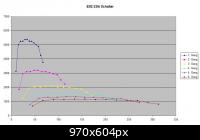 Did you notice that at 250 kph, there is no difference between 5th and 6th gear (same goes for 210kph in 4th/5th)? All because the crank torque decreases linearly in the high rpm range, such that the power is the same at 6500rpm in 5th and 5500rpm in 6th. Engines "working that way" actually have an advantage: Since you cannot choose the gear arbitrarily during acceleration, it is best when an engine can make the same type of power (i.e. maximum power) over the whole rpm range you need to reach the next gear. On the other hand, for a car with a flat torque curve, the necessary upshift to reach the next higher speed at max rpm will set you back in rpm (and thus, power). During acceleration, you will have maximum power only in short intervals. This is especially true in low gears, when the gearing ratio and resulting rpm decrease is big. That is the reason why "torquey" engines (like diesels) with the same maximum power perform better acceleration-wise than high-rpm engines with flat torque curves - they have maximum power more often. It is the same reason why diesel engines are employed for force-centric applications, like caterpillars. For example, when you bank up earth, the force increases with more earth and the caterpillar gets slower, thus engine speed decreases, but power does not, since torque increases. A gasoline engine would steadily lose its power and stall eventually.
__________________
 Last edited by meyergru; 07-27-2013 at 05:24 PM.. |
|
Appreciate
0
|
| 07-26-2013, 04:44 PM | #22 | |
|
No military grade

58
Rep 619
Posts |
Quote:
Wrong: We are talking about engines with ideally flat POWER curves like this: 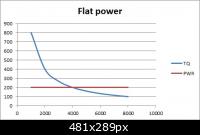 not ideally flat TORQUE curves like this: 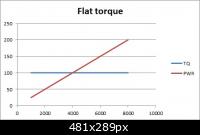 To achieve this, a decrease of crank torque with engine speed is needed. So your car is not a good example, as it has linearly increasing power with that flat torque curve. Most cars with good naturally aspirated engines would have that: 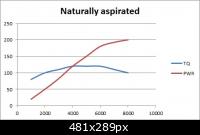 Right: Engines with a flat POWER curve do exist - at least in a limited RPM range, like here from 6000-8000 rpm: 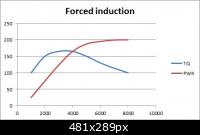
__________________
 Last edited by meyergru; 07-26-2013 at 04:49 PM.. |
|
|
Appreciate
0
|
Post Reply |
| Bookmarks |
|
|